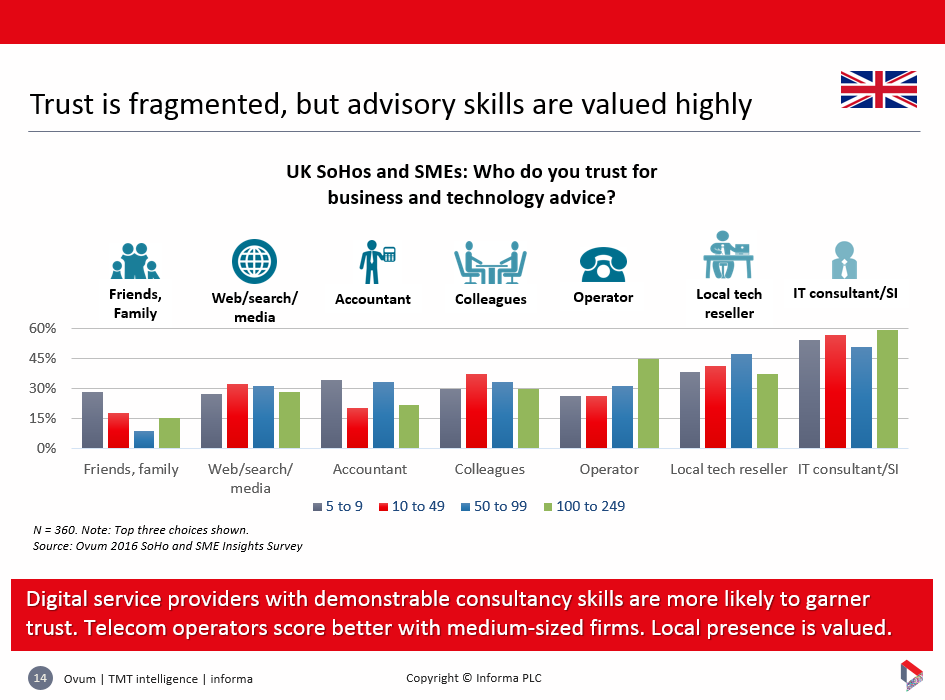It’s fairly well known that a lot of the productivity gap between the UK and other industrial countries is accounted for by a long tail of unusually unproductive small businesses (see ONS data here). This fascinating piece in the FT covers a project to do something about that by getting them management advice.
An interesting twitter conversation developed and it was suggested that the decline in the importance of bank managers had something to do with how innovations diffused through the economy, or not.
At Ovum, we recently did some survey research that touches on this. Specifically, we asked samples of people from SMEs about what they did with IT and telecoms technology. One of our questions was “Who do you trust for business and technology advice?” The following slide summarises the results for the 360 UK respondents, who were asked to give their top three choices.
For presentation reasons we applied a cut-off at 5%. Banks, as you can see, just didn’t come into it. Medium-sized firms seem to be much better served by ISPs than smaller ones.
That said, the general pattern was much the same globally, with IT consulting shops and value-added resellers winning out and a long tail of others. German firms were more likely to DIY, South Koreans to seek advice from either customers or suppliers, both results that fit with stylised facts, sorry, prejudices about those countries’ economies.
(The rest of the report is here and its international cousins are here, but you’ll need to pay for that.)

I cannot access the FT article – but from the twitter thread linked, I’m not entirely sure why you are reducing it to technology advice. Is there evidence that the productivity gap is down to slower adoption of technology?
The graph above seems to indicate that SMEs already trust technology consultancies.
I’m reducing it to technology advice because that’s what we asked them.
Sure – but that wasn’t the sole focus of the original article. Technology was mentioned once, tangentially.
I assume your own survey is going to be self selecting to an extent – presumably they already know technology is important.
Back to the original article, having dealt with a few of those organizations, outside parts of Rolls Royce, I’m not sure they necessarily qualify as shining examples of great business practice.
I think dsquared had it right fundamentally – the problem is salesmen prompted to MD, and I’d argue this is a class thing, to be an amateur engineer is as perfectly acceptable pastime for a gentleman, but to be actually dedicated to a craft is for the lower middle class (telling that many of the figures feted in the UK for engineering, turned out to be actually pretty crap – Sinclair, Dyson etc).
The final few paragraphs of this James Meek piece seem apposite here:
https://www.theguardian.com/uk/2002/oct/10/military.jamesmeek
Given the FT piece, this maybe poses questions over the quality of local IT consultants/SI. Or, as I posited on Twitter, there’s a problem with getting businesses to pay for beyond the most obvious things.
Hang on a minute – how many people trusted the telephone operator?
Really? Over an accountant?